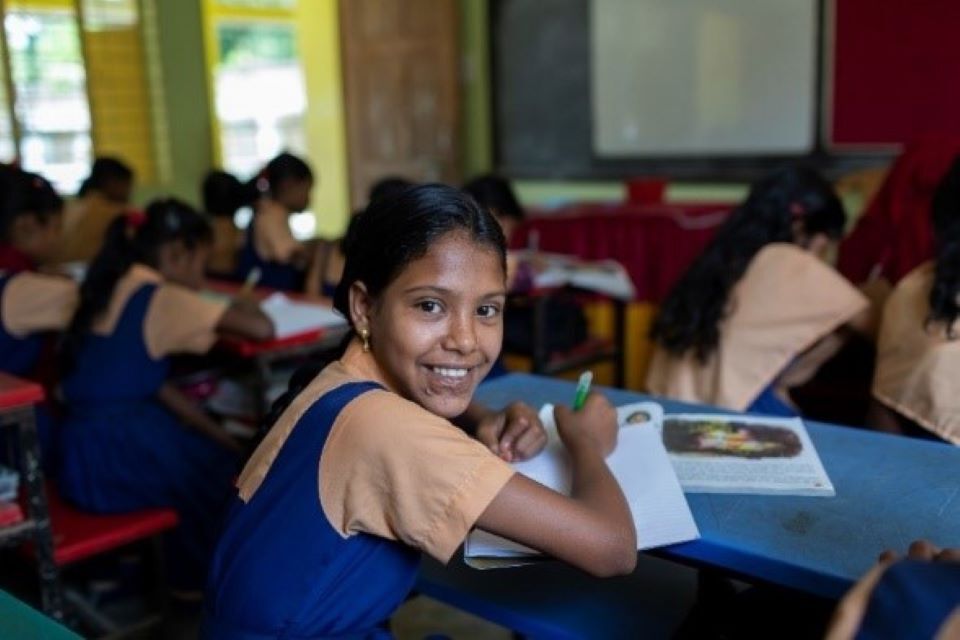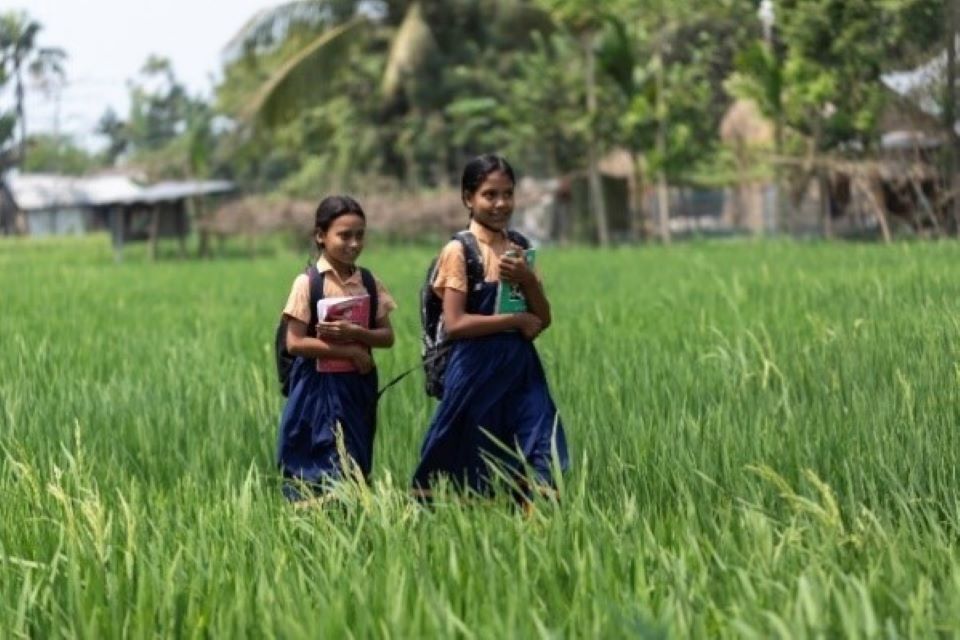Education changes lives
Updated 19 February 2024
The UK government supports education systems in lower-income countries to provide quality education for all. This starts with basic literacy, numeracy and life skills to help children express their emotions and views. These are the building blocks needed to make progress in school and gain the full rewards of education.
A girl who stays in secondary school is likely to have more choices; to earn more; to be resilient to climate change. She is more likely to get married later; and to have smaller, healthier, and better educated families [footnote 1]. Girls’ education is one of the best investments we can make to support sustainable economic and social development and break intergenerational cycles of poverty.
Case study: Linley in Malawi
Linley, from Malawi, was supported through school with UK funding delivered by CAMFED. Linley gives back to her community and since opening her own business, has supported local children with school materials and through outreach sessions. Linley has also trained as a Learner Guide (peer mentor) with CAMFED to continue her work as a champion for girls’ education and change the lives of children in her community.
Growing up in rural Malawi was not easy. Both of my parents passed away when I was just 6 years old, and my grandmother struggled financially to care for us.
A lot of things have changed in Mulanje district since the CAMFED Association sisterhood has been active here. We are able to share different ideas and skills on how we can go further with our education, how to run different types of businesses, and support many children to go back to school.
When starting out in business I struggled to raise capital, but with access to a loan through CAMFED I was able to launch my second hand clothing business. During the COVID-19 pandemic the business of selling second hand clothes was prohibited, so I used part of the loan to diversify into selling maize and farm produce. I would like my business to grow big and to become a sole trader of various farm products.
I use my earnings to support my everyday life, taking care of my grandparents, and paying school fees for my relatives. I have twice paid fees for a girl child in my community who could not afford school fees. I have provided over 13 children with school materials, and supported 18 out-of-school youths twice a month with sexual and reproductive health sessions.
Hear more from Linley about being a Learner Guide (video):
Linley, Learner Guide with CAMFED in Malawi (YouTube)
Case study: Faith in Zimbabwe
Faith, from Zimbabwe, has also become a Learner Guide in her local community. Faith graduated as a recipient of a bursary from the UK’s Zimbabwe Girls’ Secondary Education programme and is now at university. Faith wanted to help other girls, as she had been helped, so trained as a Learner Guide.
When Faith heard about Tendai, a girl in Form 4 (Year 11 equivalent), who was at risk of dropping out of school to marry an older man, she visited her home. Tendai felt that she was becoming a burden to her foster mother because they didn’t have enough food or money, especially since the COVID-19 lockdowns. She thought marriage was her only option for survival.
Faith explained how important it was for Tendai to finish school. Faith also spoke to Tendai’s foster mother, who agreed that Tendai should return to school. Thanks to Faith’s work as a Learner Guide, Tendai is now planning to complete her O-Levels.
UK funding has trained over 900 Learner Guides in Zimbabwe. Learner Guides, Teacher Mentors and other CAMFED Association members have helped over 144,000 children (including over 80,000 girls) in Zimbabwe with academic and psycho-social support under the Zimbabwe Girls’ Secondary Education programme.
Case study: Zakiyya in Nigeria
Zakiyya, a 12-year-old girl from Nigeria, was unable to attend school because her family could not afford learning materials or uniform. She was supported to return to school through the Nigeria Girls’ Education Programme and now hopes to become a doctor. The Girls’ Education Programme delivered cash transfers to 23,500 girls like Zakiyya and supported over 3,800 schools to implement early literacy interventions.
Hear more from Zakiyya about the Nigeria Girls’ Education Programme (video):
Zakkiya Bashir speaking about the Nigeria Girls Education Programme (YouTube)
Case study: Shohana in Bangladesh
Shohana, a 10-year-old girl from Bangladesh, learnt to read again after COVID-19 school closures. The last of 4 children, Shohana’s prospects are much better than those of her older siblings who had to drop out of school. Shohana dreams of a bigger life, bigger than she has been exposed to in her small home village in Mymensingh, northeast Bangladesh.

Shohana in her classroom in Bangladesh. Credit: UNICEF/Bangladesh/2023/Mawa.
Like many children in Bangladesh and beyond, Shohana’s progress was disrupted by the closure of schools during the COVID-19 pandemic. During what became one of the longest pandemic school closures worldwide, lasting 18 months, Shohana felt like she forgot everything she had learnt in school.
Shohana was in Grade 2 (UK Year 3) when schools closed in Bangladesh and was expected to transition to Grade 4 (UK Year 5) after restrictions were lifted. When children returned to school, the gaps were obvious. Shohana’s teacher says children had to re-learn alphabet letters at a time when they should have been making sentences. Some, like Shohana, did not immediately return to school when schools re-opened, getting even further behind their classmates and in danger of never returning to school.
A UK-funded, UNICEF-supported catch-up programme is helping to bring children back to school and to a knowledge level of their age. Shohana’s reading and writing have improved since she enrolled in the catch-up classes.
Shohana’s mother, Ambia, says although she cannot read herself, she wants a different life for her daughter and is happy with her daughter’s progress at the learning centre. Ambia’s goal was for all her children to go to school, but things were different when her older children were growing up. They had to drop out of school and work from an early age to make ends meet for the family.
“Shohana is now our hope. I help her get ready for school and support her however I can. I attend parents’ meetings at her school”, explains Shohana’s mother.
Shohana has regained her confidence and is hopeful for a brighter future for herself and her family. Her favourite subject is Bengali and she is now able to read out sentences from the letters and words which she has had to learn all over again.

Shohana and a classmate walking to school. Credit: UNICEF/Bangladesh/2023/Mawa.
-
Breaking down barriers to girls’ education (PDF, 430 KB) (globalpartnership.org) (Accessed 11 July 2023) ↩
